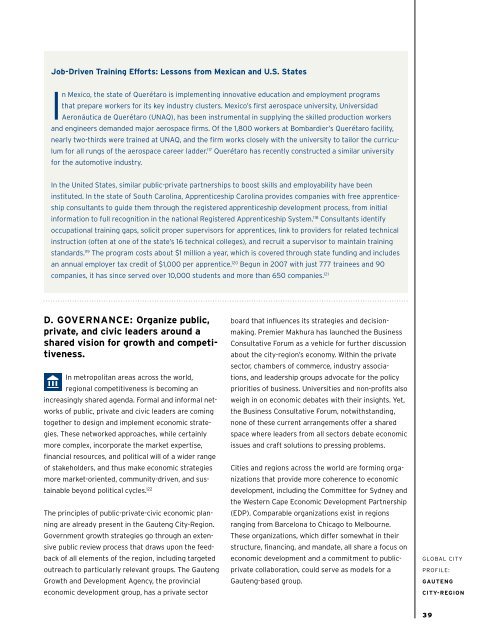SOUTH AFRICA’S
1HAwfit
1HAwfit
You also want an ePaper? Increase the reach of your titles
YUMPU automatically turns print PDFs into web optimized ePapers that Google loves.
Job-Driven Training Efforts: Lessons from Mexican and U.S. States<br />
In Mexico, the state of Querétaro is implementing innovative education and employment programs<br />
that prepare workers for its key industry clusters. Mexico’s first aerospace university, Universidad<br />
Aeronáutica de Querétaro (UNAQ), has been instrumental in supplying the skilled production workers<br />
and engineers demanded major aerospace firms. Of the 1,800 workers at Bombardier’s Querétaro facility,<br />
nearly two-thirds were trained at UNAQ, and the firm works closely with the university to tailor the curriculum<br />
for all rungs of the aerospace career ladder. 117 Querétaro has recently constructed a similar university<br />
for the automotive industry.<br />
In the United States, similar public-private partnerships to boost skills and employability have been<br />
instituted. In the state of South Carolina, Apprenticeship Carolina provides companies with free apprenticeship<br />
consultants to guide them through the registered apprenticeship development process, from initial<br />
information to full recognition in the national Registered Apprenticeship System. 118 Consultants identify<br />
occupational training gaps, solicit proper supervisors for apprentices, link to providers for related technical<br />
instruction (often at one of the state’s 16 technical colleges), and recruit a supervisor to maintain training<br />
standards. 119 The program costs about $1 million a year, which is covered through state funding and includes<br />
an annual employer tax credit of $1,000 per apprentice. 120 Begun in 2007 with just 777 trainees and 90<br />
companies, it has since served over 10,000 students and more than 650 companies. 121<br />
D. GOVERNANCE: Organize public,<br />
private, and civic leaders around a<br />
shared vision for growth and competitiveness.<br />
In metropolitan areas across the world,<br />
regional competitiveness is becoming an<br />
increasingly shared agenda. Formal and informal networks<br />
of public, private and civic leaders are coming<br />
together to design and implement economic strategies.<br />
These networked approaches, while certainly<br />
more complex, incorporate the market expertise,<br />
financial resources, and political will of a wider range<br />
of stakeholders, and thus make economic strategies<br />
more market-oriented, community-driven, and sustainable<br />
beyond political cycles. 122<br />
The principles of public-private-civic economic planning<br />
are already present in the Gauteng City-Region.<br />
Government growth strategies go through an extensive<br />
public review process that draws upon the feedback<br />
of all elements of the region, including targeted<br />
outreach to particularly relevant groups. The Gauteng<br />
Growth and Development Agency, the provincial<br />
economic development group, has a private sector<br />
board that influences its strategies and decisionmaking.<br />
Premier Makhura has launched the Business<br />
Consultative Forum as a vehicle for further discussion<br />
about the city-region’s economy. Within the private<br />
sector, chambers of commerce, industry associations,<br />
and leadership groups advocate for the policy<br />
priorities of business. Universities and non-profits also<br />
weigh in on economic debates with their insights. Yet,<br />
the Business Consultative Forum, notwithstanding,<br />
none of these current arrangements offer a shared<br />
space where leaders from all sectors debate economic<br />
issues and craft solutions to pressing problems.<br />
Cities and regions across the world are forming organizations<br />
that provide more coherence to economic<br />
development, including the Committee for Sydney and<br />
the Western Cape Economic Development Partnership<br />
(EDP). Comparable organizations exist in regions<br />
ranging from Barcelona to Chicago to Melbourne.<br />
These organizations, which differ somewhat in their<br />
structure, financing, and mandate, all share a focus on<br />
economic development and a commitment to publicprivate<br />
collaboration, could serve as models for a<br />
Gauteng-based group.<br />
GLOBAL CITY<br />
PROFILE:<br />
GAUTENG<br />
CITY-REGION<br />
39


